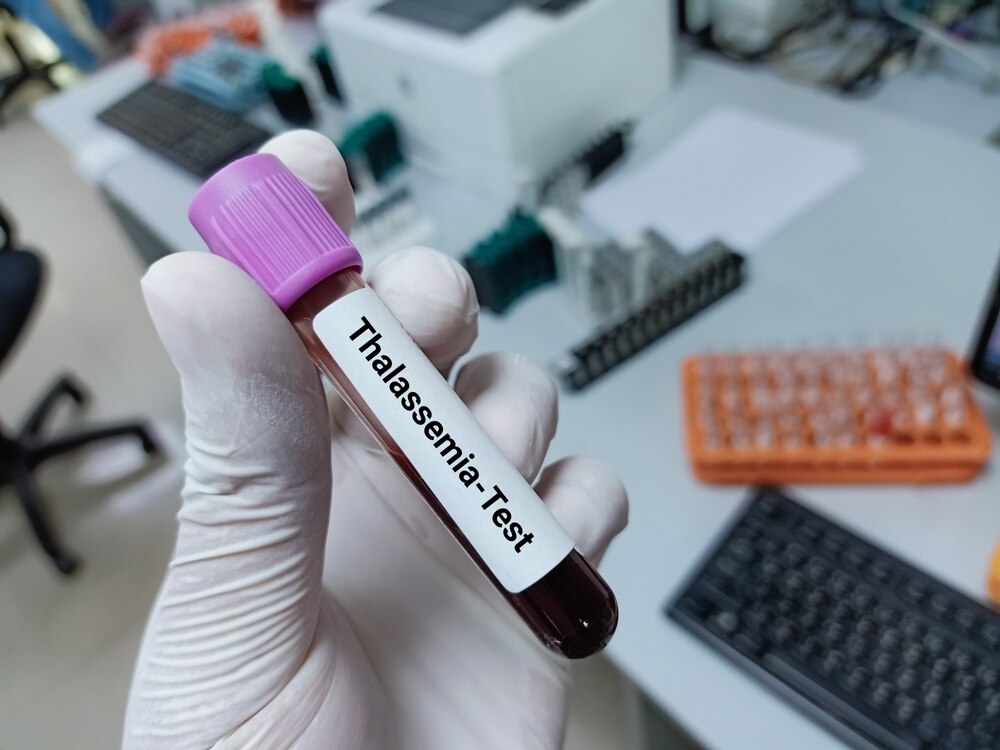
Thalassemia is a genetic blood disorder that can affect children if inherited from one or both parents. The blood disorder is a genetic anomaly that affects the body’s ability to produce hemoglobin, the protein that carries oxygen in red blood cells. Without sufficient hemoglobin, the body struggles to function properly, leading to anemia and other complications.
It’s essential for parents to understand the basics of this condition, from its causes and symptoms to its management and treatment. Vejthani Hospital offers screening as part of our IVF program to ensure parents don’t pass the gene responsible for thalassemia along to their children. Meet our doctors to discuss the IVF costs and programs at V-Fertility Center in Bangkok, Thailand.
Causes and Symptoms
The blood disorder is a result of inheriting faulty genes from parents, who may be carriers without showing any symptoms themselves. The disorder manifests when these defective genes interfere with the normal production of hemoglobin. Children with thalassemia can display signs and symptoms including:
- Fatigue
- Jaundice
- Weakness
- Pale or yellow-colored skin
- Slow growth
- Abdominal swelling
- Facial bone deformities
- Dark urine
As these symptoms mimic other common childhood ailments and conditions, parents must be vigilant and seek medical advice if they notice any of these symptoms.
Risk Factors
You are at greater risk of passing the thalassemia along to your children if your family has a history of thalassemia or you belong to a certain ancestry. The blood disorder has a greater chance of occurring in people of African, Mediterranean, or Southeast Asian descent.
Management and Treatment
People with thalassemia can have a normal life expectancy. There are effective management strategies to enhance the quality of life for those affected. One primary approach involves regular blood transfusions. These transfusions provide the necessary hemoglobin and help alleviate symptoms associated with anemia.
Another effective treatment for managing thalassemia is chelation therapy. This process involves the use of medications that help remove excess iron from the body. Since frequent blood transfusions can lead to iron overload, chelation therapy becomes essential in preventing related complications.
The only effective cure for the disorder is a stem cell or bone marrow transplant. However, this treatment is not often considered, as it has its own risks due to graft versus host disease. Graft versus host disease is a life-threatening development where transplanted cells can begin attacking the patient’s cells.
Blood Transfusions and Chelation Therapy
Iron overload is one of the most common complications in moderate to severe thalassemia cases. Patients with the blood disorder can store too much iron in their bodies, either from the disease or from undergoing frequent blood transfusions. Too much iron can damage vital organs, including your heart and liver. It can also damage your endocrine system. This system includes glands that produce hormones and regulate processes throughout the body.
Blood transfusions require careful monitoring and planning. The frequency of transfusions depends on the severity of the condition. Medical professionals closely track the patient’s iron levels to determine when a transfusion is needed.
Chelation therapy works as a safeguard against the potential dangers of iron overload. Iron accumulation in vital organs can lead to serious health issues, so chelation therapy plays a crucial role in maintaining a delicate balance of treatments.
Genetic Screening for the Thalassemia Trait
A promising medical development for prospective parents is genetic testing. Identification of thalassemia traits through genetic testing enables couples to prevent thalassemia from being inherited. This testing can be a game-changer, allowing individuals to understand their genetic makeup and take proactive steps to reduce the risks of passing on thalassemia and other conditions.
Couples who visit our center receive a consultation and undergo thalassemia screening for each case (CBC + Hb typing). In cases where the screening results show a possibility or risk of the couple having a child with thalassemia, a DNA-level diagnostic test will be conducted to assess the potential risk and severity of the disease. Thalassemia symptoms vary in severity, from mild to severe, depending on the type of thalassemia. The severe types of thalassemia, which should be addressed in family planning to prevent the disease, include:
- Homozygous α-thalassemia1 or Hb Bart’s hydrops fetalis is the most severe type. The patients usually die in utero or shortly after birth, and the disorder may also cause complications for the pregnant mother, such as preeclampsia, high blood pressure, swelling, abnormal delivery, and postpartum hemorrhage.
- Homozygous β0-thalassemia is a type of thalassemia where patients often have severe anemia by the age of 2, an enlarged liver and spleen, facial changes, and stunted growth. The disorder requires regular blood transfusions and iron chelation therapy.
- β0-thalassemia/Hb E, with clinical symptoms ranging from moderate to severe, is similar to Homozygous β-thalassemia.
Currently, if both partners are carriers of thalassemia and have a high risk of giving birth to a child with severe thalassemia, they can consult with a doctor to avoid having affected child and reduce the risk of pregnancy termination, using assisted reproductive technology (ART) to select healthy embryos.
Preimplantation Genetic Testing (PGT) screens for chromosomal abnormalities (PGT-A) and also for gene-level abnormalities (PGT-M) in cases where both partners are carriers and at risk of having a child with the disease. Both procedures can be conducted using a single sample collection from the embryo, which is then analyzed in a genetics laboratory to select embryos with normal chromosomes and without the disease for transfer into the uterus.
IVF and ICSI
At V-fertility Center, we offer two means of assisted reproductive technology (ART) fertilization: IVF and ICSI.
In-vitro fertilization (IVF) is a process in which the fertilization of eggs extracted from the womb is accomplished naturally in the lab by allowing sperm to penetrate the eggs. Intracytoplasmic sperm injection (ICSI) is the injection of a single pre-tested sperm into an egg.
Choosing ICSI + PGT-M can eliminate the risk of passing thalassemia on to a viable embryo in at-risk couples. In Thailand, thalassemia carriers make up 30-40% of the local population. This makes it necessary to have PGT-M testing performed before undergoing either IVF or ICSI. Using the ICSI process over IVF eliminates the contamination risk of extraneous sperm DNA in at-risk couples.
Consult the Experts at V-Fertility Center
The specialists at Vejthani Hospital’s V-Fertility Center are well-equipped to guide couples through the intricate process of genetic testing and family planning. Our professionals can recommend the necessary tests and outline a course of action for couples planning a family.
Visit Vejthani Hospitals V-Fertility Center
Our specialists are dedicated to providing personalized information and support to help you make informed decisions about your family’s future. Take the first step toward parenthood by making an appointment and consulting the experienced doctors at Vejthani’s V-Fertility Center today.
Article by Dr.Worawat Siripoon

OBSTETRICS AND GYNAECOLOGY-REPRODUCTIVE MEDICINE





No Comments
Sorry, the comment form is closed at this time.